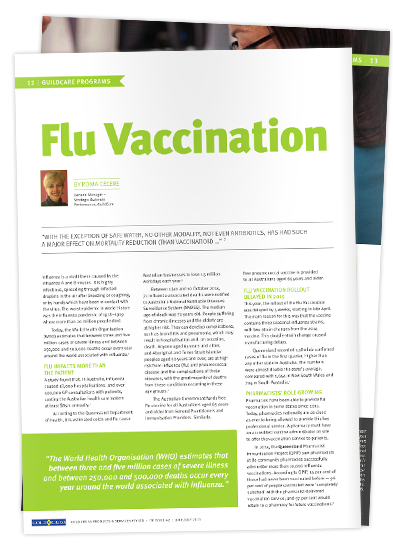Chronic Obstructive Pulmonary Disease (COPD) describes several long-term lung conditions, gradually worsening causing shortness of breath by reducing the normal flow of air through the airways. These conditions include emphysema and chronic asthma.
Influenza is a viral illness caused by the Influenza A and B viruses. It is highly infectious, spreading through infected droplets in the air after sneezing or coughing, or by hands which have been in contact with the virus. The worst epidemic in world history was the influenza pandemic of 1918–1919 where more than 20 million people died.
Today, the World Health Organisation (WHO) estimates that between three and five million cases of severe illness and between 250,000 and 500,000 deaths occur every year around the world associated with influenza.
FLU IMPACTS MORE THAN THE PATIENT
A study found that, in Australia, influenza caused 18,000 hospitalisations, and over 300,000 GP consultations with patients, costing the Australian health care system at least $85m annually.2 According to the Queensland Department of Health, it is estimated colds and flu cause Australian businesses to lose 1.5 million workdays each year. Between 1 Jan and 10 October 2014, 72 influenza-associated deaths were notified to Australia’s National Notifiable Diseases Surveillance System (NNDSS). The median age of death was 72 years old. People suffering from chronic illnesses and the elderly are at higher risk. They can develop complications, such as bronchitis and pneumonia, which may result in hospitalisation and, on occasion, death. Anyone aged 65 years and older, and Aboriginal and Torres Strait Islander peoples aged 50 years and over, are at high risk from influenza (flu) and pneumococcal disease and the complications of these diseases, with the great majority of deaths from these conditions occurring in these age groups.
The Australian Government funds free flu vaccine for all Australians aged 65 years and older from General Practitioners and Immunisation Providers. Similarly, free pneumococcal vaccine is provided to all Australians aged 65 years and older. FLU VACCINATION ROLLOUT DELAYED IN 2015
This year, the rollout of the Flu Vaccination was delayed by 5 weeks, starting in late April. The main reason for this was that the vaccine contains three seasonal influenza strains, with two strain changes from the 2014 vaccine. This double-strain change caused manufacturing delays. Queensland recorded 1,380 lab-confirmed cases of flu in the first quarter, higher than any other state in Australia. The numbers were almost double the state’s average, compared with 1,044 in New South Wales and 704 in South Australia.5 PHARMACISTS’ ROLE GROWING
Pharmacies have been able to provide flu vaccination in some states since 2011. Today, pharmacies nationally are as close as ever to being allowed to provide this key professional service. A pharmacy must have an accredited vaccine administrator on site to offer
the vaccination service to patients.
In 2014, the Queensland Pharmacist Immunisation Project (QPIP) saw pharmacists at 80 community pharmacies successfully administer more than 10,000 influenza vaccinations. According to QPIP, 14 per cent of those had never been vaccinated before — 96 per cent of people vaccinated were completely satisfied’ with the pharmacist-delivered vaccination service; and 97 per cent would return to a pharmacy for future vaccinations.In January, the Western Australia (WA) Health Department and Pharmacy Guild of WA took a significant step in reaching agreement for their Pharmacies to administer influenza vaccination. WA Guidelines state that flu vaccinations may be provided
at a Pharmacy registered under the WA Pharmacy Act 2010 and administered by those only after successfully completing accredited training programs. GUILDCARE HELPS PHARMACY MANAGE VACCINATIONS
Unlike other programs, GuildCare helps pharmacies navigate professional service delivery with one seamless software solution. It’s easy to use and records everything, allowing for patient review and their ongoing management. A Vaccination Recording Service is part of GuildCare’s Patient Services module.
It provides a patient consent form, a screening checklist for vaccination suitability and frequently asked questions to support patient interaction. The software program records the vaccine administered and all details of administration, such as batch number and site of administration. It is fully compliant with Quality Care Pharmacy Program (QCPP) and state guidelines. WHAT SUPPORT IS AVAILABLE?
The GuildCare Support Team can assist with any questions you have in becoming a subscriber. Training and technical suppurt is also available. Simpply email support@guildcare.com.au or call 1300 64 7 492 (8.30 am - 7pm AEDT weekdays). |


